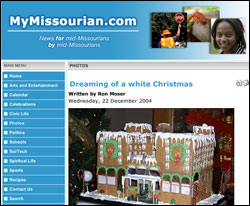By Nathan Alderman, J-Lab Online Editor
 Clyde Bentley thinks he’s found a new way for professional journalists and citizen writers to work together – a way to improve traditional media’s coverage of the news, instead of replacing it.
Clyde Bentley thinks he’s found a new way for professional journalists and citizen writers to work together – a way to improve traditional media’s coverage of the news, instead of replacing it.
Bentley, an associate professor at the Missouri School of Journalism, is testing that theory with MyMissourian.com, a student-run, community-powered local news site for Columbia, Mo.
Launched in October 2004 after less than two months’ development, MyMissourian empowers Columbia residents to write about their own lives and concerns, guided by the news judgment of students with formal journalism training.
Bentley envisioned the site as a quick, cheaply built endeavor that could be copied easily by other interested newspapers. He recruited his colleague Curt Wohleber, online editor of the university’s Columbia Missourian newspaper, to select the open-source software that would power the site. Wohleber chose Mambo, a free content management system that he could set up and customize easily and run equally well on the school’s Macintosh and Windows computers.
Meanwhile, Bentley and a group of interested students gathered to hash out the site’s user guidelines. Though they initially debated whether to judge submissions by merit, the students eventually decided “there was nothing too stupid to be on the site,” Bentley said. Instead, they laid out four ground rules to preserve some journalistic integrity: no nudity, no profanity, no personal assaults and no racial, ethnic or gender-based attacks.
MyMissourian.com’s 22-member staff meets once or twice a week to discuss new stories. They earn course credit for their work and mostly collaborate via e-mail, chat and the Web. Brian Hamman, a grad student who edits the political section, says he sometimes logs 20 to 30 hours a week working for the site. Grad students such as Hamman edit each of the various sections, supervising small staffs of undergraduate reporters tasked with going out into the community, no Internet searches allowed, and digging up good stories.
In most cases, students don’t write those stories. Instead, their job is to recruit writers from within the community. As of November 2004, just under 100 people had signed up to contribute articles to MyMissourian.com.
“People are good storytellers,” Bentley said. MyMissourian.com’s religion reporter, for instance, got two priests and a local professor of religion to discuss what makes a person good or evil in the eyes of God.
Yvette Walker, a grad student and news editor for the Kansas City Star, edits the site’s Civic Life section and has made a point of finding writers who represent groups often overlooked by the mainstream media. “It’s easy to forget to seek out these voices,” she said. “In some cases, the media tends to feature minority communities only when there’s a bad news story to be told.” Her contributors include a local African-American student who has written about how fellow black students from larger cities perceive her; a lawyer who often represents Columbia’s lesbian, bisexual, gay and transgendered community; and a disabled man who covers life in an apartment complex for elderly and disabled residents.
Even though they’re not writing, Bentley sees the site’s student staff filling an equally important role. They use their news judgment to decide which stories are most worth telling. “It takes a lot of work to keep the community putting this out,” Bentley said. Community contributors submit stories and feedback via e-mail, rather than posting directly to the site. “We made a conscious decision early on that this is journalism,” Bentley said, “and journalism requires editors.”
Bentley described MyMissourian.com’s contents as “comfort-level” reading, “the things you’d read in a newspaper 75 years ago.” The site spotlights stories that newspapers don’t have time or space to cover, or simply don’t hear about. And unlike the newspaper, Bentley said, MyMissourian.com never turns down a story, no matter how “small” it may sound. “We’re not competing with the paper,” he said. “We’re complementing it.”
After roughly two months in operation, the site had more than 200 stories, and averaged between 200 and 300 visitors a week, a number that Bentley said was “growing virally” with each new story. That growth was achieved with almost no publicity, short of a few stories in local papers and a student visit to a local festival to hand out flyers.
MyMissourian plans to expand to a weekly print edition by early 2005, taking over for the reprinted stories that the Columbia Missourian currently uses to fill space in one of its existing free “shopper” papers.
Since the university pays for hosting, and the staff volunteers its time, MyMissourian’s only expense has been registering a domain name. “We just sold our first set of ads,” Bentley said, “so I guess we’re profitable.”
Bentley is worried that sites like MyMissourian.com may be too inexpensive, too easy to set up. “The online edition was so easy to do, it’s terrifying,” he said. If traditional media fail to embrace community sites, Bentley believes the two groups will end up competing with each other. But Bentley and his students believe that hyperlocal news sites best serve their communities when run by trained journalists.
Brian Hamman believes that, contrary to the fears of traditional media, hyperlocal news sites can operate inexpensively without sacrificing responsible journalism. “We hope to show that [responsible journalism] is commercially viable on a small budget,” Hamman said. “It isn’t just a way to cut costs. I’ll consider My Missourian a success when it has lots of brothers and sisters.”



